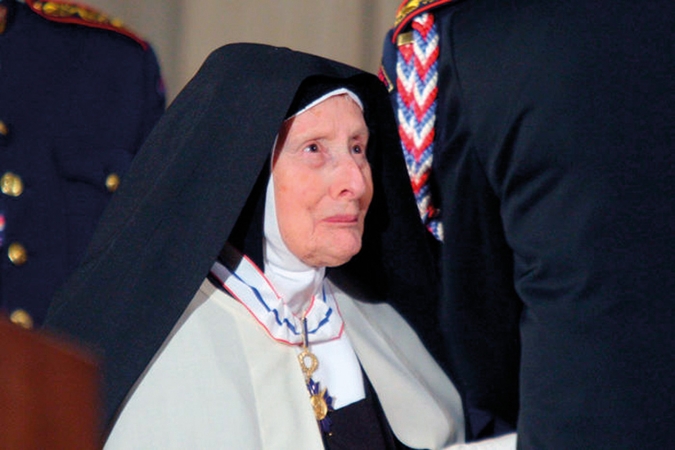
Never-ending pilgrimage of faith
Anna Magdalena Schwarzová (known as Nina) is a Czech nun – a Barefoot Carmelite. She was a religious activist, a prisoner of the Nazi and communist regimes, and now lives in the enclosed religious order of Kraków Monastery.
She was born on 14th March 1921 in Prague to a Czech Jewish family. Her father was the director of the Juta concern. The children were even christened and brought up in the spirit of Catholicism, and Nina went to the Anna girl scouts group. However, she left the group in 1938, as it was taken over by communist-oriented leaders aiming to inculcate children to have blind faith in their opinions and attitudes. Nina converted to Catholicism and decided to enter a monastery. She was accepted as a postulant, but when she admitted her Jewish roots, she was told to come back after the war. This was in 1939, and there were some serious problems in store for the Jews in the Protectorate of Bohemia and Moravia.
On December 7th 1941 she and her parents were deported to Terezín except her younger brother George (born in 1923). He was before mobilization in September 1938 (at age 15) sent to England, where he joined the army and at age 17 he became a member of the RAF, where he served as a fl ight engineer with the 311th Czechoslovak Squadron. He survived the war and later after the Soviet occupation of Czechoslovakia in 1968, he emigrated to the USA. Despite illness, hunger, and unspeakable hardship in the Terezín ghetto, Nina and her mother survived. They were not transported to the East, and remained there “happily” until the end of the war. Her father, however, was murdered by the Nazis in Auschwitz in October 1944, and other relatives met the same fate. Nina does not like to recall her time in Terezín, where, in additional to all her other troubles, she also had problems with her fellow inmates due to her conversion to Catholicism. In 1945, just a few days before the liberation of the Terezín ghetto, Nina took advantage of the situation and when the guards’ attention was diverted, she fl ed to Prague. When she returned home, there were strangers living in her fl at. Although she recognised some of the furnishings from their fl at, none of their property was ever returned. She had nothing good to look forward to in post-war Czechoslovakia.
Although she became a postulant of the Carmelite monastery, because she was looking after her mother she put off entering the monastery. She worked for the Catholic Students Centre and the Catholic Academic League, and was accepted into the monastery in 1948. After the February coup, however, she was dismissed from the novice order. After 1949 she transported food, information and instructions to the priests in the internment camps, but on February 12, 1953, she was arrested by the StB (State Security) and charged; in March 1954 she was sentenced for treason in a trumped-up trial to 11 years’ imprisonment and was stripped of her civil rights and property. After the amnesty (1960), she worked in a cable factory, from the 60s she was living in Český Krumlov, where she worked as a labourer on the night shift at the paper mill, but did not get involved in public life. In late 1968 she returned to Prague, worked as a translator for the Agricultural University and for Josef Zvěřina and Oto Mádr translated “samizdat” (selfmade) literature. She retired in 1976.
A year later she miraculously received a foreign exchange commitment, met the provincial leader of the order in Vienna, in Rome was given confi rmation that her noviciate was incomplete, took her vows, and adopted the order name of Magdalena. The StB again began to keep a fi le on her, under the name of Sára. In 1982 the StB informed the monastery in Jiřetín that her visits were unadvisable, and the monastery complied with their request. So she began to attend the monastery of the Barefoot Carmelites in the Polish city of Cracow, where she took the order’s vows in 1980. The Czechoslovakian authorities gave her permission to move. It took a long 20 years before she received the Václav Benda Award with a commemorative Medal for Freedom and Democracy by the Institute for the Study of Totalitarian Regimes in November 2010. A year later, on October 28, 2011, Czech president Václav Klaus awarded her the Order of Tomáš Garrigue Masaryk in honour of her outstanding contributions to the development of democracy, humanity and human rights. On November 17, 2011 association Post Bellum awarded her the Memory of the Nation Award. Sister Magdalena still lives with the enclosed religious order of Barefoot Carmelites in Cracow monastery to this day.
For Památník Terezín Luděk Sládek
Nesouhlas se zpracováním Vašich osobních údajů byl zaznamenán.
Váš záznam bude z databáze Vydavatelstvím KAM po Česku s.r.o. vymazán neprodleně, nejpozději však v zákonné lhůtě.